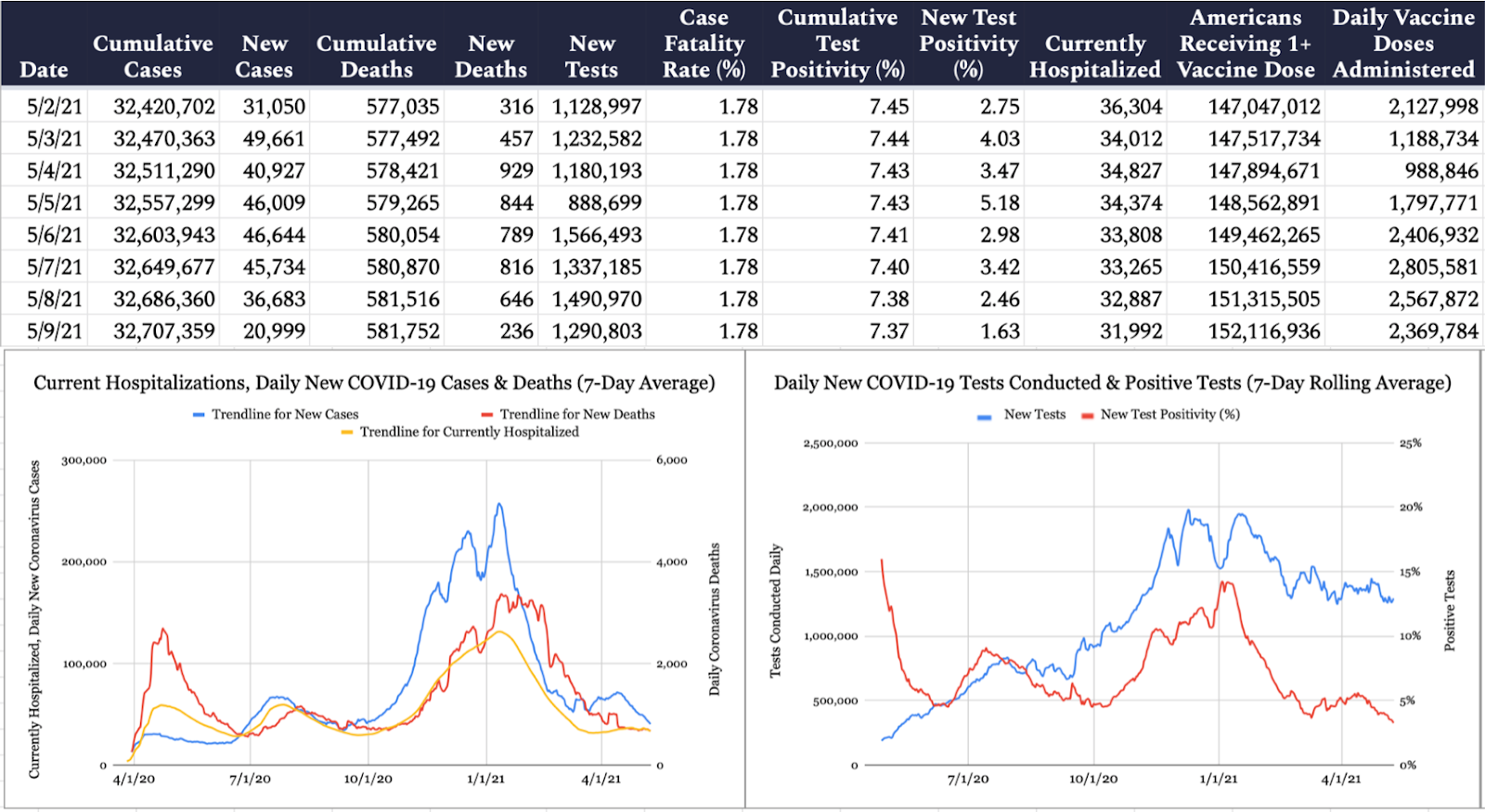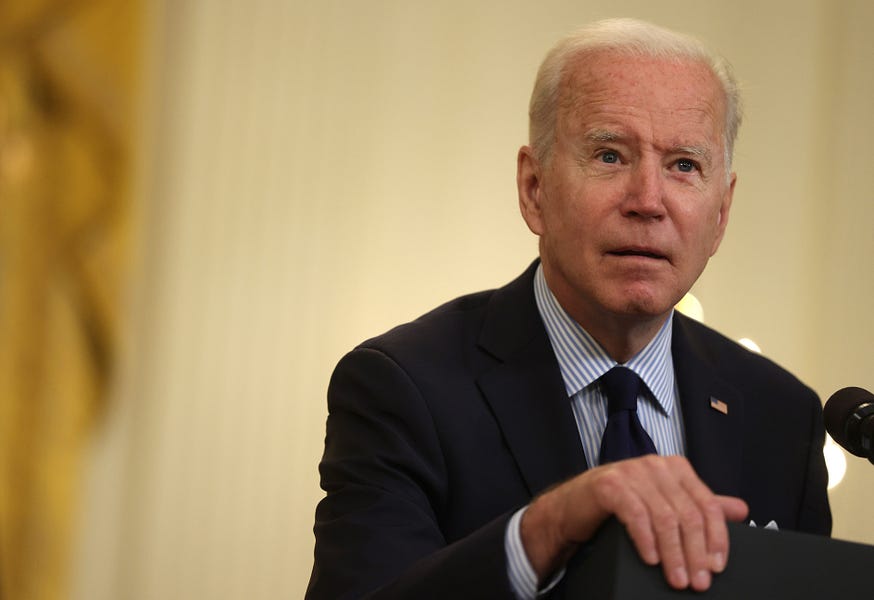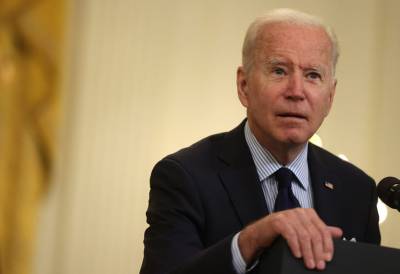Happy Monday to everyone except Medina Spirit, this year’s Kentucky Derby winner (for now) who, it turns out, is actually a total fraud and a junky. You should be ashamed of yourself, Medina.
Quick Hits: Today’s Top Stories
The economy grew at a much slower pace than projected in April, with the Labor Department reporting that employers added only 266,000 jobs last month—far fewer than the approximately 1 million that were expected. The unemployment rate ticked up slightly to 6.1 percent, and the total employment remains about 8 million jobs below pre-pandemic levels.
One of the United States’ largest oil and gas pipelines shut down operations over the weekend after it was hit by a ransomware attack that administration officials believe to have come from a criminal group, not a foreign government. The 5,500-mile pipeline transports about 45 percent of the East Coast’s fuel supply.
A series of explosions outside a school in Kabul on Saturday killed at least 50 people—many of them teenage girls—and wounded over 100 more. As worries mount over what will happen when the United States completes its withdrawal from Afghanistan, the Taliban denied responsibility for the attack. Afghan President Ashraf Ghani, however, pinned it on the group, saying the Taliban has shown “they have no interest in a peaceful solution to the current crisis.”
Protests in Jerusalem grew violent over the weekend as Palestinian activists protesting potential eviction clashed with Israeli police forces, leaving hundreds injured.
House Minority Leader Kevin McCarthy on Sunday officially endorsed Rep. Elise Stefanik to replace Rep. Liz Cheney as House Republicans’ conference chair. A vote on whether to oust Cheney is expected Wednesday morning.
A gunman in Colorado opened fire at a birthday party early Sunday morning, killing six before shooting and killing himself.
The United States confirmed 20,999 new cases of COVID-19 yesterday per the Johns Hopkins University COVID-19 Dashboard, with 1.63 percent of the 1,290,803 tests reported coming back positive. An additional 236 deaths were attributed to the virus on Sunday, bringing the pandemic’s American death toll to 581,752. According to the Centers for Disease Control, 31,992 Americans are currently hospitalized with COVID-19. Meanwhile, 2,369,784 COVID-19 vaccine doses were administered yesterday, with 152,116,936 Americans having now received at least one dose.

A Bump on the Road to Recovery?
With vaccines increasingly abundant, economic restrictions loosening, and President Joe Biden’s American Rescue Plan pumping hundreds of billions of stimulus dollars into the economy, hiring was expected to go gangbusters in April. After employers added 536,000 jobs in February and 770,000 in March, economists and financial analysts expected April’s numbers to surpass 1 million, taking a sizable bite out of the 8.4-million job gap in total employment dating back to February 2020—just before the pandemic set in.
But when the Bureau of Labor Statistics’ April report hit email inboxes at 8:30 a.m. on Friday morning, it threw D.C. into a frenzy: Only 266,000 jobs had been added, and the unemployment rate actually ticked back up ever so slightly, from 6.0 percent in March to 6.1 percent now. Drilling down a little further, most of April’s gain can be attributed to the leisure and hospitality sector, which added just over 330,000 jobs, 187,000 of which were in restaurants and bars. Those advances, however, were largely offset by a sharp decline in temporary help services (-111,000), couriers and messengers (-77,000), and manufacturing (-18,000).
Average hourly earnings inched up 0.7 percent in April—from $29.96 to $30.17—confirming lots of anecdotal evidence from recent months that the labor market is tightening despite approximately 7.4 million job openings nationwide. Total employment is still hovering around 144 million, well below the 152.5 million of just over a year ago.
The finger-pointing commenced almost immediately, with economists and policymakers on both sides of the aisle looking to assign blame for the disappointing numbers. “While the anemic jobs numbers in April are concerning, they are not surprising, given the fact that Joe Biden’s disastrous tax-and-spend packages are paying Americans more to stay home than to enter the workforce,” GOP Rep. Fred Keller of Pennsylvania said Friday.
The CARES Act signed into law by President Donald Trump last March included a federal $600-per-week boost to state unemployment benefits that resulted in nearly 70 percent of unemployment insurance (UI) recipients earning more money than they did in their previous job, according to a University of Chicago study. The American Rescue Plan signed into law by President Biden a year later extended the expanded unemployment program until September, but cut the weekly boost to $300.
Roughly an hour after Friday’s jobs report was released, the Chamber of Commerce called on lawmakers to end this benefit immediately. On Saturday, Sen. Ben Sasse announced plans to introduce legislation that would convert money already appropriated for unemployment insurance into “signing bonuses” that would pay unemployed people who get a job by July 4 101 percent of their existing unemployment benefits, distributed across multiple payments.
“A year ago, before we had vaccines, expanded unemployment benefits started to pay more than work,” said Sasse, who unsuccessfully pushed to scrap those benefits last year before the CARES Act was signed. “The emergency need was real, but the emergency plan was flawed. The emergency UI program is now penalizing people for going back to work.”
It wasn’t just Republicans making this argument. “In recent months the demand side of the labor market appears to be recovering more quickly than the supply side, as businesses are increasingly posting job openings while employees have been relatively slow to return to the labor force,” Jason Furman, a top economist in the Obama administration, wrote Friday. In addition to persistent concerns over workplace safety and continued remote schooling in some areas keeping parents at home, Furman credited the federal UI boost for the lack of slack in the labor market.
“Increased unemployment insurance has resulted in unemployment benefits being more valuable than wages for roughly half of the unemployed,” he noted. “This does not appear to have been a major factor in the labor market in 2020, but labor market conditions are completely different now. … Arguments that unemployment insurance benefits increase the bargaining power of the unemployed are equivalent to saying they reduce labor supply at any given wage.”
Biden took a different approach, telling reporters he believed the enhanced UI benefits had no “measurable” impact on April’s numbers. “Listening to commentators today as I was getting dressed, you might think that we should be disappointed,” the president said in remarks Friday. “But when we passed the American Rescue Plan, I want to remind everybody, it was designed to help us over the course of a year. Not 60 days, a year. We never thought that, after the first 50 or 60 days, everything would be fine.”
Instead, Biden focused on the past three months in aggregate. “All told, our economy has added more than 1,500,000 new jobs since I took office,” he said. “That’s the most number of jobs created in the first three months of any presidency in our history.” (Though accurate, it’s a bit disingenuous for Biden to take credit for this trend, which has more to do with the course of the pandemic than his election.)
Others in the administration echoed Biden’s lack of concern. “It’s our view that these misalignments and bottlenecks are transitory,” said Jared Bernstein, a member of the White House’s Council of Economic Advisers. “They’re what you expect from an economy going from shutdown to reopening.”
For precisely those reasons, Daniel Bunn—an economist at the nonpartisan Tax Foundation—cautioned against reading too much into one month of data. “You see in-person services hiring more, and delivery services cutting back. There are signs that we’re switching off from the pandemic economy and signs that we’re switching on the post-pandemic economy,” he told The Dispatch. “The top line numbers of any jobs report always attract attention, but these days with this economy and the transitions that are happening, it will be worth taking a wait and see approach before drawing strong conclusions from this one report.”
The Colonial Pipeline Hack
While Americans spent Friday and Saturday with an eye on the sky in anticipation of plummeting Chinese space debris, a cyber attack of unknown origins triggered the shutdown of the East Coast’s largest underground fuel line. Breaches of critical infrastructure are becoming increasingly common nationwide, with many firms in the energy sector—which is heavily reliant on automation—finding themselves ill-prepared to combat increasingly sophisticated hacking operations.
Friday’s infiltration—which targeted Colonial Pipeline Co.—temporarily disrupted the movement of gasoline, diesel, jet fuel, and other refined petroleum products supplying major cities up and down the coast. According to the company’s website, the conduit connecting the Gulf Coast to New Jersey transports about 100 million gallons of fuel every single day. The Federal Motor Carrier Safety Administration on Sunday declared a state of emergency, affecting 17 states and Washington, D.C.
“We proactively took certain systems offline to contain the threat, which has temporarily halted all pipeline operations, and affected some of our IT systems,” Colonial said Saturday. “Upon learning of the issue, a leading, third-party cybersecurity firm was engaged, and they have launched an investigation into the nature and scope of this incident, which is ongoing. We have contacted law enforcement and other federal agencies.”
Just after 5 p.m. on Sunday, the company provided an update: “While our mainlines (Lines 1, 2, 3 and 4) remain offline, some smaller lateral lines between terminals and delivery points are now operational. We are in the process of restoring service to other laterals and will bring our full system back online only when we believe it is safe to do so, and in full compliance with the approval of all federal regulations.”
Because Colonial’s steps were preventative, the halt is not expected to drive up prices or impact supplies too dramatically—as long as things are back on track within a few days. But with summer approaching and coronavirus restrictions loosening, American demand for fuel is only going up. Patrick De Haan, head of petroleum analysis at data provider GasBuddy, reported that U.S. gasoline demand jumped 2.4 percent over the weekend, reaching a “new post-COVID” Saturday high.
The attack on Colonial deployed ransomware, software typically used to extort victims by infiltrating networks and threatening to lock, delete, or expose data unless a specified payment is made. The culprits in this instance are yet to be revealed, but the ransomware tactic is generally associated with criminal opportunism rather than state-sponsored efforts. The Washington Post reports some U.S. officials believe the breach to be the work of DarkSide, an Eastern European hacking group.
The Department of Homeland Security’s Cybersecurity and Infrastructure Security Agency (CISA) is working alongside Colonial to determine the source of the attack. “This underscores the threat that ransomware poses to organizations regardless of size or sector,” said Eric Goldstein, CISA’s executive assistant director. “We encourage every organization to take action to strengthen their cybersecurity posture to reduce their exposure to these types of threats.”
This latest breach comes on the heels of a hack at a water treatment plant in Oldsmar, Florida this February, when an unknown assailant attempted to unleash a dangerous level of lye into the city’s water supply.
It also follows an expansive cyber attack on various federal agencies—including the U.S. Departments of State, Homeland Security, Treasury, and Commerce—late last year. A virus originating from Moscow-backed hackers spread to more than 18,000 government and private computer networks, prompting the Biden administration to institute a series of sanctions on Russian entities. FireEye—the cybersecurity firm responsible for detecting the malware—is also involved in the Colonial investigation.
While there’s little to be discerned from the attack now, it’s clear that this tactic is here to stay. “It’s a top priority for the administration. Unfortunately, these sorts of attacks are becoming more frequent,” Commerce Secretary Gina Raimondo said on CBS’s Face the Nation Sunday. “And we are working closely with the company, state and local officials to, you know, make sure that they get back up to normal operations as quickly as possible and there aren’t disruptions in supply.”
“There’s a ton we still don’t know about the Colonial Pipeline shutdown. But we do know some things: First, multiple policy and national security leaders have warned that our critical infrastructure is catastrophically vulnerable to cyber disruptions,” said Klon Kitchen, national security fellow at the American Enterprise Institute and author of The Kitchen Sync newsletter. “Second, ransomware attackers and other online ‘blackhats’ feel way too safe. It’s time to turn the screws on these folks and to let them know that we will not sit back any longer.”
“Third, we need to treat these attacks as acts of cyberterrorism—we should turn our intelligence and military cyber forces loose so that they can detect, deter, and dismantle ransomware attackers and networks,” Kitchen told The Dispatch. “And nations that harbor or facilitate these attackers and networks should be engaged accordingly.”
Worth Your Time
You’re not going to want to miss Kevin D. Williamson’s take on the latest round of GOP in-fighting. “[Kevin] McCarthy et al. talk about the political situation like they are talking about the weather, as though it were something that just happened to them rather than something that is the result of their own choices, decisions, and actions,” he writes at National Review. “Somehow, Trump has convinced McCarthy et al. that Republicans can’t win without him—even though he quite recently has demonstrated, as plainly as can be, that they cannot win with him. Republican leaders are living in talk-radio reality.”
In her Mother’s Day column for the New York Times, Elizabeth Bruenig writes about her and her husband’s decision to have children young—and how she doesn’t regret it for a minute, even as Millennials increasingly delay having kids. “One of the things they don’t tell you about having babies is that you don’t ever have a baby; you have your baby, which is, to you, the ur-baby, the sum of all babies,” she writes. “The moment they laid her damp rosy body on my chest, I knew she would envelop my world.”
In a piece for the Deseret News, Jonathan Rauch makes an optimistic case for compromise, relying on an agreement forged between the Church of Jesus Christ of Latter-day Saints and the LGBTQ community in Utah regarding nondiscrimination protections as an example. “As any experienced negotiator knows, sitting across the table gives people information and understanding about the other side. Often it builds relationships, and sometimes even friendships,” he writes. “Even when we disagree on our core beliefs about faith and identity and justice, we can still share the country. We can still reverse spirals of polarization. We might even replenish respect for America’s longest four-letter word: compromise.”
Presented Without Comment
Also Presented Without Comment (Click for Video)
Toeing the Company Line
With Rep. Liz Cheney’s ouster from House GOP leadership increasingly likely, Haley and Audrey joined Sarah and Steve on TheDispatch Podcast to discuss what it all means for the party.
In his Friday G-File, Jonah focuses on language. A few Democratic congresswomen and progressive organizations trotted out the term “birthing person” last week as a replacement for mother, because “it's not just cis-gender women that can get pregnant and give birth.” Jonah had thoughts. “If one of the core tenets of the new Great Awokening is that the term ‘mother’ is divisive or bigoted, then the Great Awokening is doomed (and deservedly so),” he writes. “Don’t tell me conservatives are too obsessed with silly and divisive culture war ‘distractions,’ if in the next breath you’re going to lecture me on the need to erase the term ‘mother’ from the English language.”
In his late-week French Press (🔒), David argues that the GOP has a grassroots problem. “The Republican base is often unhinged, increasingly radicalized, and intolerant of dissent,” he argues. “We can’t properly diagnose what ails the GOP unless we’re honest about the composition of the GOP.” Then, on Sunday, he looks into the damage he believes American Christendom is doing to American Christianity. “America doesn’t have a state-established church, but it certainly possesses a version of the Christendom [Søren] Kierkegaard despised,” he writes. “America possesses immensely powerful, immensely wealthy Christian institutions that may not be part of the state but in many places are strong enough to exercise power over the state. And they certainly create their own culture, a culture that shapes the daily lives of millions of Americans.”
Let Us Know
Have the expanded unemployment benefits affected your decision to return to work or your ability to hire? Or the employment status of those you know?
Reporting by Declan Garvey (@declanpgarvey), Andrew Egger (@EggerDC), Haley Byrd Wilt (@byrdinator), Audrey Fahlberg (@FahlOutBerg), Charlotte Lawson (@charlotteUVA), Ryan Brown (@RyanP_Brown), and Steve Hayes (@stephenfhayes).







Please note that we at The Dispatch hold ourselves, our work, and our commenters to a higher standard than other places on the internet. We welcome comments that foster genuine debate or discussion—including comments critical of us or our work—but responses that include ad hominem attacks on fellow Dispatch members or are intended to stoke fear and anger may be moderated.
With your membership, you only have the ability to comment on The Morning Dispatch articles. Consider upgrading to join the conversation everywhere.